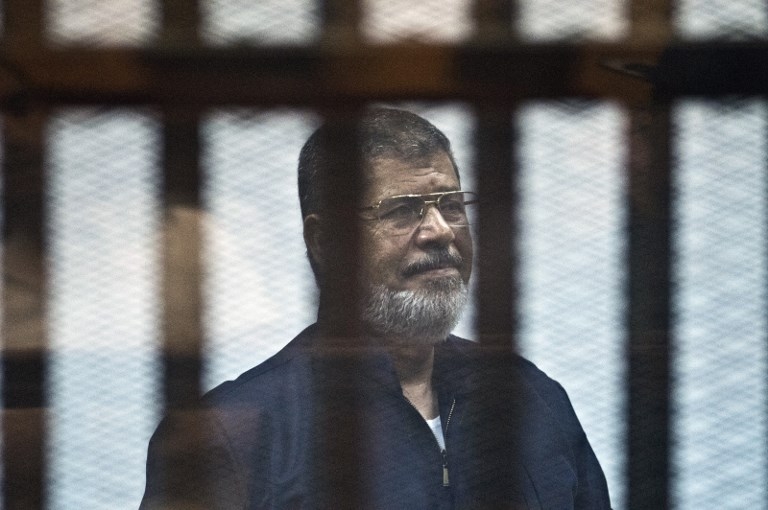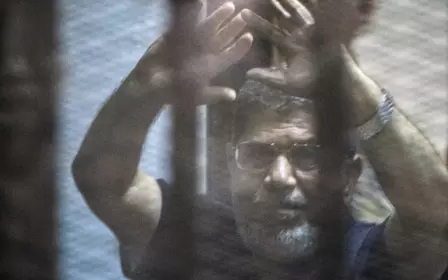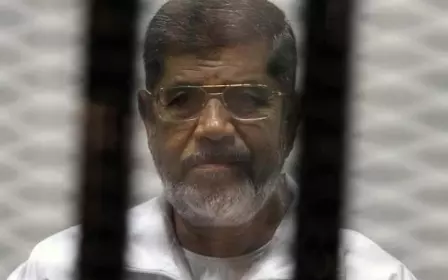Morsi vows never to recognise Sisi's coup, says son after prison visit

Deposed Egyptian President Mohamed Morsi told his family in a rare visit that he “would never, ever recognise the coup” that ousted him from power in 2013, his son has said.
Morsi’s family visited him on 19 September in their third visit since the 3 July 2013 coup led by then-defence minister Abdel Fattah el-Sisi, who is now president. The two other visits were on 6 November 2013 and 4 June 2017.
On 5 December, Morsi’s lawyers submitted a petition to the administrative court requesting regular visits for his family.
Details of the visit - the first in which Morsi's three sons were allowed to see him - were recounted by Abdullah Morsi to London-based news site Arabi21.
According to the report, Morsi’s son Abdullah said he and his two brothers and sister, along with their mother Najlaa, saw the former president last month. The visit lasted only 25 minutes and no lawyer was present, he said.
Morsi told his family that “out of respect for the Egyptian people and their choices” he would not recognise the legitimacy of the Sisi government, despite the ongoing crackdown against him and his supporters.
Morsi is the country’s first democratically elected president, and a member of the now-banned Muslim Brotherhood group.
He was sentenced to death and various jail terms totalling 48 years in five separate cases, on charges including espionage with Hamas, Hezbollah and Qatar, and insulting the judiciary. He is currently appealing all of the sentences against him.
Concerning his health, which has reportedly deteriorated in detention, his son said overall he “seemed well”.
However, he said Morsi still suffers from chronic diabetes and, as a result of the unhygienic prison conditions and denial of access to medication, he has suffered “severe repercussions”, including extreme weakness in the left eye, ulcers in the mouth and the jaws, and hypoglycemic comas.
Inadequate care
Last March, a panel of British parliamentarians and international lawyers warned that Morsi may die prematurely as a result of inadequate medical care.
“As a result of being forced to sleep on the floor, he has suffered acute rheumatic inflammations in the backbone and in the neck vertebrae,” Morsi’s son said.
The former president requested medical treatment as far back as 8 August 2015. But despite a repeated court order that he should be allowed to see a diabetes specialist, this has not happened until the date of the last visit. On 29 November, his family reported this medical negligence to the court, but with no success.
On Wednesday, Cairo criminal court adjourned a hearing against Morsi and 23 others in the case known as “Espionage with Hamas”. The next session will he held on 4 November.
Morsi is denied access to the media, and is barred from having any books or papers, according to Abdullah. He is also denied any contact with others, except the prison guards.
Restrictions on his family visits were criticised by Human Rights Watch (HRW) last year as unlawful.
“Egyptian authorities appear to have seriously violated former President Morsi’s due process rights and may be interfering in his proper medical treatment,” said Joe Stork, then deputy Middle East and North Africa director at HRW.
“Morsi’s treatment is a window into the appalling conditions suffered by thousands of political detainees in Egypt.”
New MEE newsletter: Jerusalem Dispatch
Sign up to get the latest insights and analysis on Israel-Palestine, alongside Turkey Unpacked and other MEE newsletters
Middle East Eye delivers independent and unrivalled coverage and analysis of the Middle East, North Africa and beyond. To learn more about republishing this content and the associated fees, please fill out this form. More about MEE can be found here.




